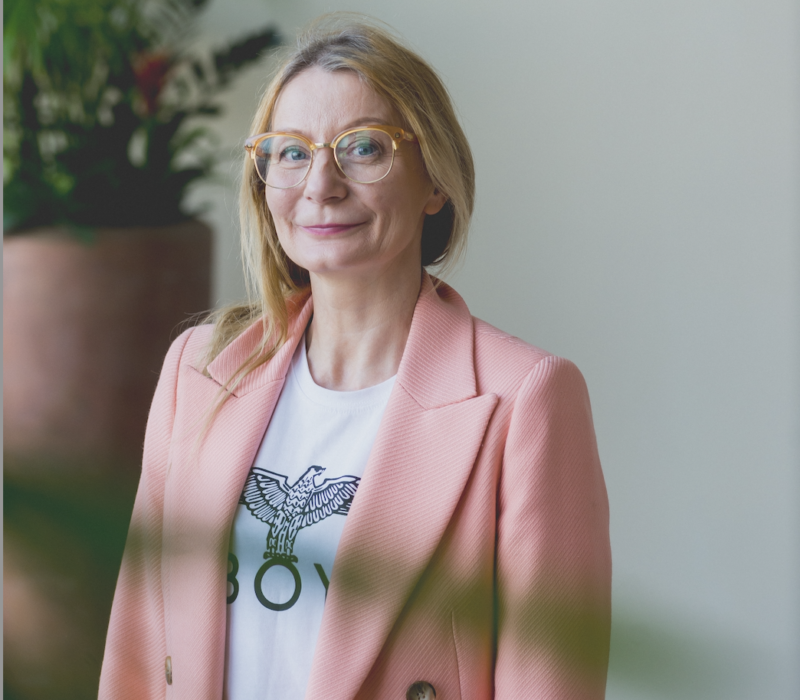Jo Chidley is a Chemist, Circular Economy Expert, Herbal Botanist and the Founder of Beauty Kitchen, a company on a mission to create the most effective, natural and sustainable beauty products in the world. With Beauty Kitchen being cited as a ‘Best for World’ brand*, Europe’s highest scoring B Corp beauty brand, and winner of Marie Claire’s UK 2022 Prix D’Excellence Sustainable Beauty Award, Jo is widely regarded as a pioneer in sustainable beauty.
Can you tell us a little about your background and the company?
We created Beauty Kitchen in 2014 when I realised how hard it was to find natural and sustainable products that really worked. Beauty Kitchen is a pioneer of sustainable beauty products, delivering great results with natural ingredients while also working tirelessly to build a responsible future.
How did the idea come to you for the company?
I studied chemistry and then I fell into HR. I worked for some large organisations, including Avon Cosmetics and, even though my role was Head of HR, I still felt like I was a part of the beauty industry. I have been a beauty junkie for as long as I can remember.
It was around 2010 that I started thinking that I should take matters into my own hands, and the timing for it seemed right. Back then, there was a massive divide between science-based products and the beauty industry. There was also this stereotype floating around that you had to be this ultimate scientist to be able to create skincare and, because of that, I felt that the industry had lost its fun and its accessibility. I wanted to fix that.
With my husband Stuart, I launched Beauty Kitchen in 2014, marking the first step in creating what is now the most sustainable beauty brand in the world and B Corp’s highest rated beauty brand in Europe.
How did you achieve awareness?
Networking, building relationships and collective action with partners such as B Corp have been hugely important in driving awareness of what we do. I’m co-Chair of the British Beauty Council’s Sustainable Beauty Coalition, and of B Corp’s Sustainable Beauty Coalition, so these provide a vital platform to ensure that important sustainability issues within the beauty industry remain high on the agenda, whilst also shining a light on the work that we do at Beauty Kitchen and our planet-first approach.
People want to be part of a movement and to have access to sustainable products that don’t mean compromising on quality. We’re fortunate that once people have tried our products, they tend to become loyal customers – and then they help by spreading the word about Beauty Kitchen too.
How have you been able to gain funding and grow?
When we started Beauty Kitchen, we spent every spare penny. We didn’t have holidays. Everything was invested into the business, and we had no outside investment, only loans. Many, many people helped to support us because people believed in the environmental message.
Today, we remain fiercely independent; we have no external funders, so operate with much tighter budgets than other larger beauty brands. We have however been fortunate to gain financial support through bodies including Scottish Enterprise, Business Gateway and RBS, and collaboration with our suppliers has also contributed to this.
Beauty Kitchen is based on innovation and driving change throughout the industry – we open-source our innovation for the greater good of the industry, which has given us a mechanism for support from wider industry bodies and people too. One example of this was the development of a lid which could be more easily recycled than others – we worked with our supply partner at Richmond Containers to develop the product, then sharing this knowledge with the industry for the betterment of our planet.
What are the key successes?
- Being able to demonstrate that genuinely sustainable and efficacious beauty products can be created and bringing others on this journey.
- Becoming the number one B Corp Beauty brand in Europe.
- Delivering our returnable packaging programme Reposit – the first closed-loop system for packaging in FMCG.
- Having shown that you can build a business through boot-strapping – this just gives you different stakeholders to manage.
- Being able to put our vision first over profit, which has allowed us to innovate without constraint and bias.
- Being open source and transparent, creating an environment of trust with the people we work with and trying to role model this continually.
- Inspiring others to do things sustainably – it’s about having thousands of businesses doing sustainability imperfectly, rather than few doing it perfectly.
- Being able to face into the challenges of our industry and keep to the mantra of progress over perfection – fail fast, fail cheap, learn, and move on to the next iteration.
What were/are the challenges and how have you overcome these?
- Collective action in a business is rare – in fact, this term was used mostly for Unions and to support workers – but by taking this principal and encouraging our competitors to do well, we have to think wider than our own profit. We want to celebrate this beautiful industry and encourage change to transition to a circular economy where you dematerialise and can still have a product-based business.
- That being said, one of our biggest challenges is standing out in a competitive industry, set alongside large players who have big investment budgets. We don’t have this same kind of budget and influence, so we need to think very differently and be more creative. This uniqueness is also, however, one of our key strengths.
What are your plans now/for the future?
- We plan to build on the regenerative ingredients that will make Beauty Kitchen’s products even better and which will give something back in terms of biodiversity rather than depleting such resources – one example of this is our latest launch, Pure Source Collagen Collection; these products, which stimulate our own collagen from both the inside and outside, do so through the addition of four pure and potent microalgae. To avoid unnecessary farming of algae in the oceans, which can affect marine life, we have created our own sustainable algae farms, on land, which mirror the sea’s conditions, absorb CO2, and produce oxygen and energy! We extract the powerful nutrients from this algae and put these into the products, delivering scientifically proven formulas that deliver transformative results.
- We want to make collective action an economic model that becomes the norm, and which is no longer considered the niche for our industry through certification and coalitions.
- We want to realise our ambition of dematerialising the beauty industry and creating value, rather than waste.
- We aim to continue to foster diversity across all aspects of our business, from people and environment to ingredients and innovation.
What would you like to share with others to encourage them to start their own entrepreneurship journey?
- Start now, even if you are in another role – this can often be the ideal time to support the development of something new.
- Find a co-founder or mentor who can support your early days – their advice and experience might be invaluable.
- Play around – become the expert in your field and find your niche; this might even take you on a different path and towards a new business idea.
- Find your tribe and use the entrepreneurial networks that are in your area – network, network, network!
- If you fail, dust yourself down and move on – learning from your mistakes is far more important than dwelling on them.
Can you share your top tips for entrepreneurial success?
- The word success doesn’t really resonate with me; as a scientist, it’s always about iterations (there is no success, it’s another milestone in the larger plan). For example, the reason why my business exists is to save the planet for the future of my family, friends and because it’s the right thing to do. However, my role and my business is still just a cog in the universal wheel. Knowing this early on prevents your ego from taking over.
- Be playful, energetic, enthusiastic, and open to learning, including being challenged. There will be times when you might be considered the ‘Mad Hatter’ in the room, but you need to have the courage to be disliked (see Adler’s Psychology).
- Be creative and innovative – if it feels too hard, there is usually a simpler way.
- Be collaborative, but also be mindful of bystanders, naysayers and mood-hoovers – these people are unlikely to add any value.
- Grow your network and pitch as often as you can; hard work, perseverance and determination often pays off.
Who are the 5 people who inspire you the most and why?
- Oriele Frank: Co-founder of Elemis, Oriele built a business from the ground up, based on the service our industry should offer – she wants to develop the collective action playbook.
- Char Love: Global Director of Advocacy at Natura&Co, the world’s biggest B Corp, Char is a B Corp Guru who demonstrates how to be both a business and an activist
- Stuart Chidley: My husband, Co-founder, a feminist and the main challenger to my ideas. I hugely support his desire and ambition to create a single use plastic free world.
- Octavia Butler: The American novelist and a pioneer figure in the white, male-dominated field of sci fi (I’m a big reader). Her novels could have been written today and reading them keeps my ego in check.
- Adam Smith: A Scottish economist and philosopher who was a pioneer in the thinking of political economy and a key figure during the Scottish Enlightenment. His teaching was about community-based economics and collective action, but has been skewed to fit our current version of capitalism.
What are your favourite inspirational /motivational quotes?
- “No one is too small to make a difference,” Greta Thunberg
- “Be the change you want to see in the world,” Mahatma Ghandi
- “No society can surely be flourishing and happy, of which the far greater part of the members are poor and miserable,” Adam Smith
What are your Instagram, Facebook and LinkedIn social handles and also website links so our readers can connect with you?
https://www.instagram.com/beautykitchen/
https://www.facebook.com/beautykitchenhttps://www.linkedin.com/company/beauty-kitchen-ltd/






